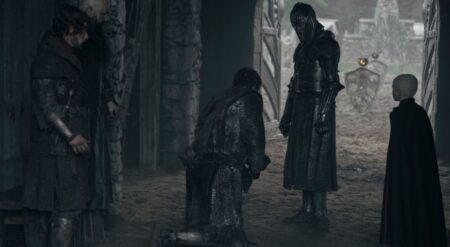
Teen dramas were a dime a dozen on television in the 2000s and have begun making a revival, especially on Netflix. But instead of telling the same story with different character names, the streaming service has been looking to showcase a different lens to tell these coming of age stories. On My Block, presenting a grounded take on the genre with a focus on the inner city, mainly Mexican-American teenagers. The Society brings the science fiction genre to the party focussing on the lives of Middle-American privileged kids who are thrust into responsibility. And now Jinn finds its home on the platform as a supernatural thriller that also serves are as a coming of age story with love, loss, and life in Amman, Jordan.
Jinn is the first Arabic-language Netflix Original series created and executive produced by Mir-Jean Bou Chaaya, Elan Dassani, and Rajeev Dassani alongside Christian Bou Chaaya and Lucien Bou Chaaya. In five episodes, Jinn follows Jordanian teenagers after they sneak away from their class while on a school trip to the ancient city of Petra and realize that they have disturbed an ancient and supernatural force. As the reality of jinn becomes apparent after the death of a friend and continued strange happenings within the friend group. The teens must work to save the world from an evil jinn who will stop at nothing to become whole and remain in the world.
As a teen drama, each member of the cast brings out different elements of traditional tropes. There is Yassin (Sultan Alkhail), the outcast with a bad home life who is looking for acceptance which is countered by Tarek (bdelrazzaq Jarkas), his tormenter and typical jerk/jock character. There is Mira (Salma Malhas), the popular girl with a tragic story who is looking for her place and refuses to go with the flow, even if it ruins her relationship with her boyfriend Fahed (Yasser Al Hadi) who at this point just wants to get laid. Then, there is Layla (Ban Halaweh), a girl who is boy crazy and fine in the status quo, selfies and all. And finally, my favorite character of the bunch, Hassan (Zaid Zoubi). The Randy of the group, the one guy who knows everything there is to know about the supernatural force threatening and killing the group of friends.
While the teens face a dangerous jinn, they also deal with issues of identity, romance, and turbulent home lives. Our main character Yassin and Mira live different lives. One on the outside and one on the inside, but both carrying their own pain and issues. When they both come into contact with different jinns, one character loses their mother and brother in an unnamed accident and the other is in a home with an abusive step-father and no way to save their mother, Jinn showcases problems deeper than a teen romance. And it does so by balancing a search for acceptance, fear, and questions of identity common in the world of teen drama television.
Jinn’s characters ultimately fit into a neat box established in by other shows before it. That being said, the way Jinn cohesively builds out a supernatural world separates it from anything on television and as the first Arabic-language, Arab focused, Netflix Original, it’s use of the jinn and the lore serves as both a touchpoint for those within the culture while also working as an original concept to new audiences outside of Arab culture.
In addition, by making the jinn take teenage forms, the involvement in a world of hormone-fueled emotion like a high school serves as a solid foundation to build lore. The characters of Keras (Hamzeh Okab) and Vera (Aysha Shahaltough), jinn who follow the teens back home after Petra, serve as a bridge between the supernatural and high school – tethering the two worlds together. But one of the fascinating things about this series is learning that although they’re jinn, they were once human.
The best supernatural stories teach the audience through the characters’ perspective. Jinn falls into this. There is never heavy exposition when there could be. Instead, it’s done comedically through Hassan, the young teen who is obsessed with the lore of the jinn. Like Randy in Scream, he helps teach us about the laws they obey, how they can be dispelled, and how they can be called. There is a beauty in the world building of the jinn.
Jinn throws curveballs at the viewer, are the jinn evil? Are they good? Are they somewhere in between? For those unfamiliar with the concept of the jinn, they are the only one of God’s creations in the Qur’an that isn’t innately oriented towards good or bound to it. Unlike the jinn, humans are oriented towards goods and angels are bound to it, according to the Qur’an. But with the ability to choose between good and evil, the jinn can possess and harm and but also work to save. This is
As supernatural beings, the jinn have powers and the series shows them. While the effects are nothing to write home about, especially the wounding, it is executed well enough. The best pieces of the effects are in the jinn’s teleporting. They arrive in a swirl of sand and leave just as beautifully. That being said, much of the power usage relies on the actions of others involved as there are no special affects used, just awkward staring or a nice force choke.
Next, to the worldbuilding. The relationships in the series feel real, if not overacted at times. Mira’s eventual connection to Keras is heartwarming and her relationship with her father, as he attempts to remain in his daughter’s life after the trauma of losing her mother, is sad and relatable. Mira is connected to the world, to her friends, to herself.
Then, you have Yassin, a teen cut off from relationships. He is bullied, his mother is abused, and he is helpless to help himself of those around him. As an outcast, it’s this sadness that makes Vera’s draw to him predatory. Vera is exploitive of his pain and Yassin, desperate for connection is a willing prey. In the final episode, his sadness is palpable and if there is a second season, there is much to be explored as Mira moves to save him.
Overall, Jinn is a solid teen drama. From characters to worldbuilding the show succeeds above the quality of teen drama on network television. As the first Arabic-language original, this series opens the door for more titles exploring Arab experiences and using their cultural mythology to build out a world that American viewers have not seen before.
Sadly, the future of Jinn is floating in the ether, with some communities in Jordan, the country in which it is set, having asked for the show to be pulled from Netflix, citing immorality. Since Netflix has agreed to removing content in the past at the behest of governments, it’s unclear if the show will see any more seasons or if it will simply pulled from the country. I for one need more, five episodes was too short an order for such a great series – not to mention the cliffhanger ending. We’ll have to wait, see, and maybe make a wish.
Jinn Season 1
-
Rating - 8/108/10
TL;DR
Overall, Jinn is a solid teen drama. From characters to worldbuilding the show succeeds above the quality of teen drama on network television. As the first Arabic-language original, this series opens the door for more titles exploring Arab experiences and using their cultural mythology to build out a world that American viewers have not seen before.






